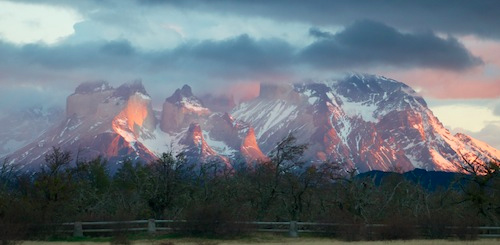I was running. I was shouting. I was a bit off my rocker, over-exhausted and maxed physically and emotionally somewhere on a gravel road.
It was September in far-south Chile, early spring in the hemisphere, and I’d come to race in an inaugural event, the Patagonian International Marathon.

Wind crushed from ahead. The course tilted uphill. Every muscle, every tired tendon and sore joint numbed as I shouted out thanks and joy and stream of consciousness gibberish to invisible friends, family, the world, the universe.
Torres del Paine National Park, a fairytale wilderness setting, seems to have that effect on people. Perhaps even more so in the depths of a marathon.
At 26.2 miles, the course was measured and certified to standards of the sport. Pretty much everything else was not. Set in a landscape of soaring towers, rugged plains, and wild weather, the marathon is unlike anything you’ll see in the United States.

There are no cheering masses. Aid stations are bare-bones, and the course — which followed gravel roads through the park — is significantly more difficult than the street marathon you might have trained for back home.
About 400 runners came to Patagonia to run. The remote race could be seen as a hallmark in the trend of “destination marathons,” essentially where a sanctioned event provides a great excuse to travel somewhere far away and off the map.
Many runners came from within Chile, too, including a contingent from the nearby towns of Punta Arenas and Puerto Natales. I came from Denver, a day-long journey of 5,000+ miles and a longtime in an airplane seat.

Then a bus ride for hours north from Punta Arenas to Torres del Paine. A night in a hotel. A shuttle bus to the starting area, and finally, as the wind moved in, we began to run.
It happened to be my first marathon. The starting gun went off a little later than scheduled, but as competitors warmed up on the shore of icy Lake Pehoe, nobody seemed to mind.
The race followed the main access road to the park, a gravel-and-rock strip of earth that winds through hills and valleys, past water, and under the parks soaring spires.
In the early miles of the race I gazed around in wonder. My feet pounded a steady beat. In front of me were the Torres. Blue ice winked from below a thick blanket of snow high on the mountains, and dark clouds hurried past the peaks.
The wind was a force when it arrived. The first gusts struck me from behind at about the halfway point to provide a little help up an ungodly climb. Later, the wind, famous in this region, shifted and smacked me in the face.

With a few miles to go, at the top of a nasty climb, the course snaked through a valley. It went straight into the teeth of the howling wind — I tell no lie, this was the wind of hurricanes and winter storms.
The legendary Patagonian gale was now pounding at my chest. My legs fought to cross the final miles. I tried to get skinny and low. I leaned into the gusts and did the only thing I could — I kept running.
I crossed the finish line completely spent, almost collapsing in the dirt. It had been 3 hours and 18 minutes, a solid time for my first marathon under these conditions. I was happy with my effort and very happy to be done.

Later I found Omar Aguilar Cardenas, a new acquaintance and the Chilean marathon record holder. He had finished the event in second-place in 3 hours 8 minutes but quipped “this is a race that you don’t think about the time,” he said.
I couldn’t agree more. The race had occupied a full week of my life, including the past 3+ hours and then all the prep and travel time to the remote place near the tip of South America for days before that.
Lukie Myers, an Australian living in Santiago, won the event in 2 hours, 57 minutes. “It was tough and incredible,” he said. “Just to be here, to be able to run in the park. Every run is special but this is really special. This place is bigger than me.”
—Contributing editor Sean McCoy took 5th place overall in the Patagonian International Marathon. He reported live from Chile for a week to race and cover the event.

